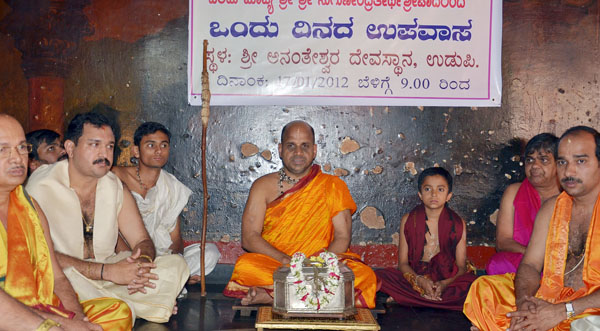Udupi, January 17: On Tuesday both Pejawar seer Sri Vishwesha Theertha Swamiji and Putthige Mutt seer Sri Sugunendra Theertha sat on fasting, to build pressure on each other, in an attempt to find a solution on the controversy over not inviting Sugunendra Theertha Swamiji to the Sode Paryaya celebrations.
Sri Vishwesha Theertha Swamiji started his fasting in Mumbai at 7 pm on Monday, much earlier to the fasting announced by Sugunedra Theertha Swamiji.
Sri Sugunendra Theertha Swamiji started his fasting infront of the Madhwacharya Sannidhana at Anantheshwara Temple, in Car Street on Tuesday morning and he expected to continue his fasting till 5 am of Wednesday.
Pejawar seer held several meetings of matadhipathis, inn his mutt to find a solution to the dead lock but failed in his efforts. It is considered as a major set back to him who intervenes and mediates in many of the crisis in and out of Karnataka.
Pejawar Swamiji told press persons that the meeting failed to come to a solution to the crisis as Krishnapur Mutt pontiff Vidyasagara Theertha rejected all the proposals of involving Sugunendra Theertha in the Sode Paryaya festival.
The matadhipathis wanted Sugunednra Theertha Swamiji to agree for two conditions. He was asked to give in writing that he did not touch the idol of lord Krishna during his Paryaya term. He was also asked not to induct his junior on his own and nominate a shishya to whom Krishnapur Mutt pontiff Vidyasagara would induct. As Putthige seer did not agree to those conditions, the meeting failed to find out a solutins, Pejawar said.
Incoming Paryaya pontiff Sode seer Sri vishwavallabha Theertha Swamiji was bent upon following his guru Krishnapur Mutt pontiff Sri Vidyasagara Theertha, he added.



Earlier
Udupi, January 17: Sugunendra Tirtha Swami of Puttige Math has begun his fast on Tuesday protesting the decision to keep him out of the Paryaya Festival.
The omission of the name of Sugunendra Tirtha Swami of Puttige Math in the invitation for the Paryaya Durbar of Vishwavallabha Tirtha Swami of Sode Vadiraja Math had sparked the present crisis.
Interestingly, the Pejawar seer Vishwesha Tirtha Swamiji will begin his fast in response to Puttige seer's fast from midnight today.
Sugunendra Tirtha began his fast at 9 a.m. at Ananteshwar Temple after performing his routine morning poojas and will end the fast at 5 a.m. on January 18.
Meanwhile Puttige Swami gave a 'last chance' to Sode Math seer to invite him for the Paryaya, which will happen on Wednesday.
“There is still an opportunity for Sode Math seer to invite me for the Paryaya Darbar. I will definitely attend the programme, if I receive an invitation,” he declared.
Puttige seer also made it clear that the fast was not against anyone and particularly not against Pejawar math seer. “This is not against anyone. The fast is for the unity of the Ashta Math,” he said. He also asked his disciples not to raise slogans against any Swamiji while he was on fast.
He also warned the other seers of the Ashta Math that if he was not invited it will set a bad precedent. “I have my turn in a couple of years. I will be ascending the Paryaya Peetha for the fourth time. I have my own ideas of Paryaya. I may even organize an inter-religious meet during my Paryaya festival. I also intend to invite the seers of various Hindu maths for the Paryaya,” he said.
Meanwhile, Pejawar seer will go on fast from midnight of January 17 till noon on January 18 as he could not have meals when Sugunendra Tirtha Swami of Puttige Math was forgoing it. He, would, however, have two glasses of milk on each day.
The Sode Math seer would ascend the Paryaya Peetha at the Sri Krishna Math/Temple here on Wednesday.
It is believed that the Puttige seer was not invited to the Paryaya Durbar because he visited foreign countries, which is a taboo among a majority of the seers of Ashta Maths.
Meanwhile, efforts to end the stalemate continued with Pejawar seer declaring that the negotiations were on to find a breakthrough. “Negotiations have continued. Talks are going on at a private level. Therefore he should end his fast immediately. I will also withdraw my fast,” he said.
Chief Minister Sadananda Gowda, who is supposed to be the chief guest at Wednesday's programme, maintained that the invitation row was an “internal matter” of the Ashta Maths. “We have requested them to find a solution. They have resolved similar controversies earlier as well. The government will not interfere in the issue,” he said, in reaction to a query from journalists in Mangalore.






Comments
Add new comment